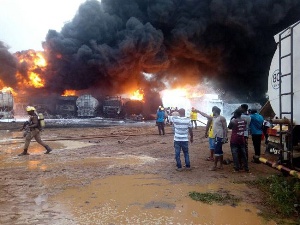By: Dr Joe Asamoah
The NPA, EPA and Fire Service must tighten their oversight of these oil and gas stations in terms of adherence to HSE guidelines so that avoidable accidents never happen or the probability of their occurrences is reduced to the barest minimum.
It is said that fire is a good servant, but a bad master. There is no denying the good services that fire provides mankind. However, the abuse or abnormal use of fire has very dire consequences, leading to loss of lives, property and others.
Elsewhere, there is respect and strict adherence to laid down procedures and guidelines concerning zoning of areas by the Town and Country Planning Department in consultation with statutory bodies whose functions are similar to those of our National Petroleum Authority (NPA), Environmental Protection Agency (EPA), Fire Service, Lands Commission, etc.
Further, at other jurisdictions, the city authorities over and above the collection of all manner of tolls and levies look at ways of decongesting cities and towns to make vehicular and human traffic flow very orderly. Of course, the bottom line is that we do not allow our statutory bodies to function independently, but often sacrifice them on the altar of political expediency and cronyism.
We seem to have lost our appreciation of aesthetics and have only become interested in putting up edifices and structures at no-go areas no matter the consequences. Indiscipline has become our cup of tea. Let me return to my topic.
What is a BLEVE?
What is a ‘Boiling Liquid Expanding Vapour Explosion (BLEVE)? The catastrophic failure of a vessel containing a superheated liquid such as propane, butane or LPG resulting from external fire pressure impinging on the walls of the vessel leads to a BLEVE. Due to the fire pressuring the vessel, the relief valve is forced to open, allowing the vapour under pressure to escape.
With the decrease in the liquid level in the vessel, the vessel above the liquid level is impinged by the flame. Subsequently, there is weakening of the vessel wall, resulting in tear, which causes disastrous failure of the vessel (Roberts, n.d.).
Why should we be concerned about the menace of a BLEVE? As a people, we seem to have thrown caution to the wind and are preoccupied with doing ‘anything’ that will bring in money. We have seen oil and gas filling stations springing up at places they are not supposed to, especially in residential areas. In some cases, these stations are virtually next to each other. Are there any rules governing the location of these stations and the minimum distance between stations in a given geographic area? Prior to the completion of a gas station, the poor residents complain about the virtual hazard literally being planted at their backyards, but their protestations do not go far. In some cases, the area is cordoned off by sky-high aluminium sheets with no signage displayed to show what is being done inside.
Lo and behold, the job is done hurriedly and the poor residents have no more say, till a disaster occurs! What happened to the maxim of NIMBY – not in my background? Are we not getting to a situation or are we already there, where the highly-connected and/or rich ride roughshod over everyone else, when it comes to having their way?
Safety First
A lot of lives have been lost within the past five years or so through BLEVE, and the latest that comes to mind is the tragedy that occurred at La within the precincts of the Trade Fair Centre, where the sister of the Minister of Trade and Industry lost her life. The question that emerges is what caused this disaster. Apparently, there was a generation of a fireball during the BLEVE from a gas filling station across the road at the Burma Camp end of the Trade Fair Centre. This resulted in a rapid combustion of the released flammable material that travelled some distance and landed inside the Trade Fair Centre, where her office was situated.
Further, during a BLEVE, potential vessel fragments resulting from the rupture may be propelled as missiles. The latter can travel several distances depending on the wind speed, direction and other ambient conditions. Are we forgetting something? We need to turn our attention to the management of the oil and gas filling stations. Do they provide adequate health, safety and environment (HSE) training to the attendants manning the stations, or is it business-as-usual where grabbing more for less appear to be the paradigm? All lives are equal, and in our bid to make more money, we should not forget that the lives of those who help us to achieve our goal are as important as ours.
The role of the regulatory bodies
The NPA, EPA and Fire Service must tighten their oversight of these oil and gas stations in terms of adherence to HSE guidelines so that avoidable accidents never happen or the probability of their occurrences is reduced to the barest minimum. How sacrosanct are our Environmental and Safety Impact Assessment (ESIA) reports prior to the installation of these oil and gas stations? Or are they mere formalities? There should not be business-as-usual, and supervision must be sublime and carried to optimal levels.
No shortcuts must be allowed, and all jobs at these stations should be carried out painstakingly, with utmost HSE consciousness. With the power of fireballs, and possibility of fragments being propelled as missiles, which are unleashed when a BLEVE occurs, we all need to be extremely cautious. Some level of proactivity on the part of the regulatory bodies, management and even stakeholders is always required to avoid a BLEVE from rearing its ugly head in our cities, towns and villages. Why? The consequences are dire and difficult to control. What about the onlookers?
From what has been said about the destructive ability of fireballs, the power of fragments, onlookers need to move completely away from a BLEVE. The Fire Service which has been trained to handle a BLEVE must be unhindered to do its work. As for journalists, I think they know what to do, but they need to think safety first. I am yet to hear of them getting caught up in the destructive path of a BLEVE.
Lastly, no matter the circumstances, reports on BLEVE must be timeously released by the powers that be. Is the June 3, 2015 Kwame Nkrumah Circle twin disaster report and its White Paper still classified? We cannot learn from our mistakes, if we do not let people know what really caused the disaster. With the sheer loss of lives, no one must attempt to do any cover up, at the expense of precious lives. Every life matters!
Opinions of Sunday, 2 April 2017
Columnist: Dr Joe Asamoah















